Report to the world abroad: I've been incredibly remiss. I have no idea how to fill in the blanks between a month ago and now. I fluctuate like an aperture, a sine wave. I've had the greatest, the worst, the busiest, and the most tedious experiences of my life all in sequence. Time seems to race by, or it seems a lifetime since I rolled into the West Bank on January 31st. I've been incredibly busy here. Two days ago I thought I was a failure. This week I feel competent, on a good path, useful. Before all that I felt elated, and before that lost. But it's fine. Sometimes it's good enough to move forward, ceaselessly, and let the days shape how your muscles and callouses grow. It's time to describe Nablus.
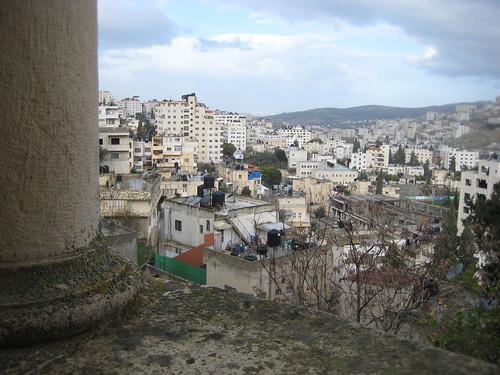
To get us started I'll re-wind my notebook to my first impressions, on January 31st.
"Nablus is fantastic. I knew before that it was couched in a valley, and that Israeli barriers had destroyed its economy until the militarization ceased in 2009. The city center features a masterpiece of a shopping drag that rises to the south, it's absolutely filled with pedestrians day and night, criss-crossing the domain of merciless taxis. Fashionable stores rub elbows with sooty, wobbly eggplant carts, and boys looking fresh from the club greet wrinkled old men wearing what appears to be conglomerated dirt. There's an incredible food selection in the markets, fresh fruit and veggies overflowing at every corner. Everyone must know how to cook. The main fruit and vegetable market is off the central square in a canopied corridor, typical bustle of people and cheap, delicious stuff. Nizar, a Project Hope employee showed me a few preserved treasures like a large scale functional soap factory, which appears to make one product only: 6 oz blocks of fragrant olive-oil soap, spread out on the floor and arranged into insectoid columns to store and cure in a beautiful old warehouse, the floor slick with the sheen.
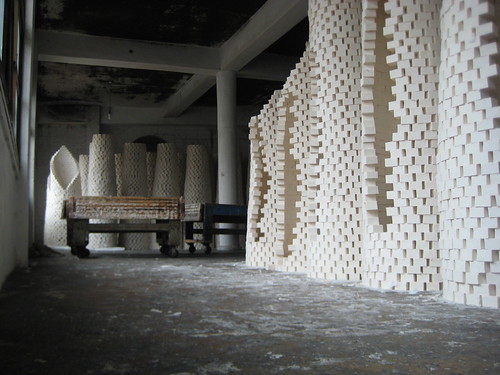
The old city is a remarkable mix of living history and a profound record of the abuse this place has been through. Computer shops operating out of ancient arched-stone structures, smooth walls getting narrower and narrower. It's ancient, and picturesque, but suddenly here and there you'll discover bullet-riddled walls and officially-ensconced memorials to suicide martyrs, from as recently as the second intifada (2002). Nizar briefly said hi to a young good-natured guy who had a vague look about him, who flinched when Nizar playfully pinched his stomach. 'Is he blind?' I asked. 'Yeah, he was injured' 'During the intifada?' 'He was trying to pull apart an undetonated shell stuck in a wall. He wanted to throw the explosive from it, and sell the copper. It exploded in his face.'
The markets here are less crowded but more claustrophobic, filled with delicious sweets, spreads, olives, dates, cheese, and tons of amazing-smelling bread. I'm in heaven. And unlike in Israel I know the rudiments of how to ask for things. But only the rudiments. Palestinian Arabic is tough and my brain is like a lead balloon. I don't hear subtle distinctions and remember things even more infrequently. I think the learning curve's steep but even on day one can see a light at the end of the tunnel. In truth I'm exhilarated to be here. If I hack this one out I may have a pretty rad future. If I could speak Arabic well, I could see myself working in this region for a really long time. Nablus is fully alive, in a way that only a place strangled by a brutal fate really can be."
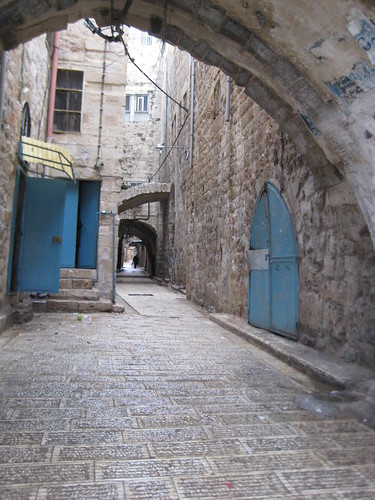
I feel pretty good about my initial description still, tempered by a few new realizations that I've come to over time. For one, winter in the mid-east mountains is a perpetual wet spring, with weeks clammy and misty and others in full sunny contrast, perfectly temperate, and possibly even more beautiful. It's a lot like San Francisco, in a way. I think I really fell for this kind of weather in my second week. It had been raining 4 days straight and the world was wrapped in one of those surreal mists that wets your face and helps sound travel. I was walking down a huge ancient set of steps that descend the mountianside beside our house. All chipped up and knobby. It was dusk, and through the fog the call-to prayer reverberated, creating unearthly echoes the likes of which I've never heard. otherwise it was deadly silent. I was alone, in the heart of far away. I live for moments like that. I was so struck by the evening call to prayer I made a little video featuring it later, in the rain. It fails to capture what I experienced, but it's a nice little moment:
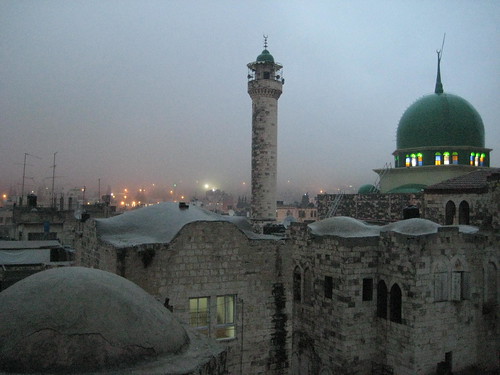
Nablus is my home now, though I'm still a stranger in it. I always will be, no matter how good my Arabic gets. The call of "taal, taal ijnebi/come, come stranger!" follows me everywhere, and depending on the combination of my apparel, company, or mode of transport I'm conspicuous enough to singlehandedly draw substantial crowds. Because of this my relationship to my home is a strange one. The public sphere isn't a place I can be by myself, but I don't mind that. I take pleasure in making friends every few meters and try not to be inconvenienced by it. This level of conspicuousness effects me greatly and changes the way I behave. I rarely take pictures in public, any more, and my photos reflect that. I feel awkward and invasive all the time, pulling out a camera puts it over the top. Of course my photography suffers from this, we'll see if I improve in time and can start asking people for their photos again. Friday is a respite, as the streets are dead, and a bustling merchant district becomes abandoned.
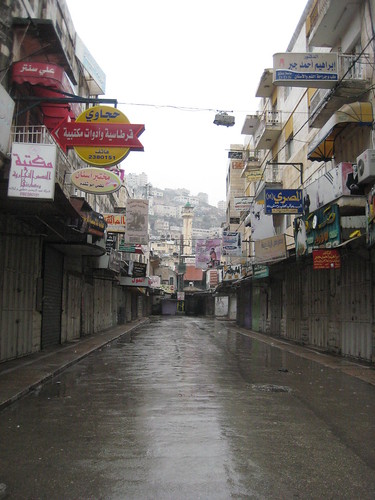
Since I'm our narrator here what could a visit be without the view-from-a-bike report? It's fantastic. I swerve and weave like a self-possessed fakenger listening to 'a band of horses' and people LOVE IT. Everyone treats you like it's your birthday. I always have an audience here, but on the bike I'm in my element, obviously, and I ham it up, obviously. It's a party. This city's on a hill, so you bomb through the potholes and minarets and dodge taxis, and they roll down their windows and say funny stuff to you then you dodge some ladies jaywalking and cut to another lane of traffic to avoid the lettuce cart guy splitting lanes against you then you swerve around a military gooseneck, pass some autoshops and a landfill, and you're at the refugee camp, exhausted, having about 200 near misses along the way.
There's much more to say, and much more to show, but enough. Stay tuned next time for either the people, the navigation, or even more harrowing, the classes!
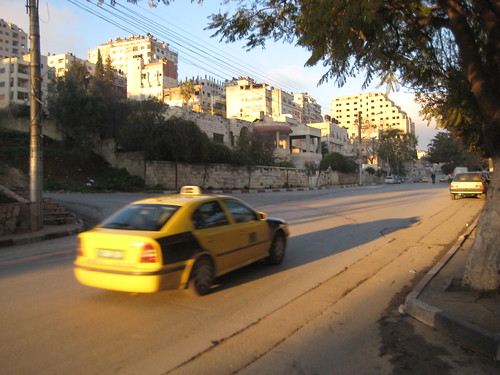
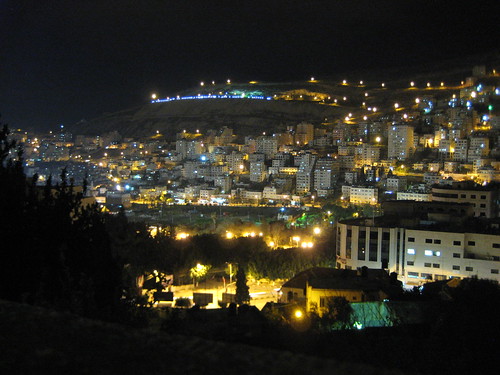
Wednesday, March 2, 2011
Being in Nablus: Mountain of Fire
Labels:
humanitarian division,
most popular,
nablus,
palestine,
The Dada Factory
Subscribe to:
Post Comments (Atom)



























8 comments:
you are a a beautiful person davey davis.
First of all, soap stacks!!
Second of all, I'm glad that you can generally perceive this adventure positively right now, in spite of the relatively massive amplitude of your sine wave.
Third of all, I don't know quite how to say this (so you're in for a ramble), but your reality has become almost unfathomable to me. I have a hard time comprehending anything about this experience you're having, though the clarity of your writing helps bridge the gap a bit. You're doing something fictional, in my mind. I guess I mean, you're convincing me that, foreign as it may be to my sensibilities, I need to force myself into a situation where I am fundamentally, physically displaced for a little while. You make it (fiction) seem possible (survivable) to me (someday).
Thanks, Davey.
GAHH! please keep writing! you describe nablus so perfectly, every intricate detail, i feel it!
Thanks guys! It's fun to be here right now. I have lunch scheduled with one of my students families, this morning I biked to the top of the mountain until I encountered an Israeli checkpoint. I could have gone through, being a foreigner, but it weirded me out so I left.
Luke, it's funny, I am off doing something strange by normal standards, but once you get used to the city, the culture, the pace of life here it could be anywhere. You just do the work you have to do and try to make it as meaningful and fun as possible, then you find ways to fill your time. For example, I look forward to my bike ride each day, just like I do at home, and each day I talk to strangers and get groceries and run little errands. That stuff never changes.
In some ways being a complete stranger to the language would be easier, because I wouldn't feel compelled to try, I could just smile and point and people would understand that I didn't speak Arabic. as it is I'm in this grey area, just beginning to understand concepts but unable to articulate anything well. That's the roughest part.
It could be because I've been studying for the MCAT for the last 10 hours and my brain is fried, or because it's 3am here-- but this blog ("Two days ago I thought I was a failure. This week I feel competent, on a good path, useful. Before all that I felt elated, and before that lost."), reminds me of Feynman's path-integral formulation: basically that a particle traveling from point A to point B traverses an infinite number of paths before it arrives at its destination.
You'll get the hang of the language. The photos and your dialogue are beautiful.
Beth, you rock so hard for translating my metaphor into theoretical particle physics! Viva Feynman!
@ Luke - I second that.
Beautiful as always. I have so much to learn from you and others about translating my experiences into language. I spent the past week in DC and had so many different thoughts and felt even more emotions, but the descriptions of them stay mostly in my head. I would like to learn to tease them out.
It is lovely to read updates from you, and I hope you continue to find balance - or beauty - in the high points and low points.
Love,
the sister
Post a Comment